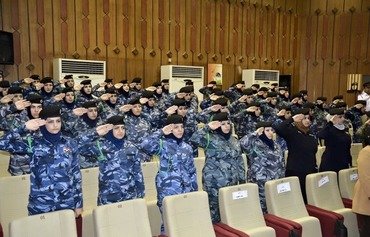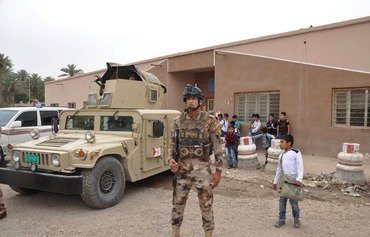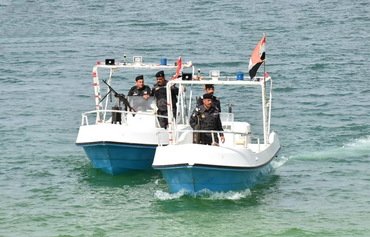The Iraqi government is planning to hand over security in cities liberated from the "Islamic State of Iraq and Syria" (ISIS) to the Ministry of Interior, in a move that has been welcomed by Iraqi security experts.
Security experts told Diyaruna they see the transfer of these duties from the army to the police as necessary, due to the general state of stability following the war on ISIS.
In anticipation of the move, there should be efforts to step up the capacity of the ministry's agencies, in terms of training and increasing intelligence efforts, they said.
It is expected that the security responsibility will be handed over in full to the police force at the start of next year, with the first phase covering five Iraqi provinces: al-Diwaniya, Wasit, Maysan, Dhi Qar and al-Muthanna.
![Members of the Anbar SWAT team are seen during a demonstration to showcase their skills in this photo, posted online on October 1st. [Photo courtesy of Anbar Police]](/cnmi_di/images/2018/11/15/15317-Anbar-SWAT-team-600_384.jpg)
Members of the Anbar SWAT team are seen during a demonstration to showcase their skills in this photo, posted online on October 1st. [Photo courtesy of Anbar Police]
The decision to transfer responsibility back to the police is "significant", security expert and former Ministry of Interior official Jassim Hanoun told Diyaruna.
"Today, we are facing a new set of variables on the ground," he said, noting that the threat posed by extremist groups such as ISIS has waned.
"This is a historic accomplishment, which would not have happened without all the forces, regardless of their titles, standing united," he said.
"The victory has restored normalcy, and now the security responsibilities have to be restructured, since the conditions that forced us to always be on alert are gone," he added.
Police are well trained
"It is important during the current stage that we hand over the responsibility for security in the cities to the Ministry of Interior, without the need for military forces being present in neighbourhoods," Hanoun said.
"The police are well trained, and there is an advanced intelligence apparatus that relies on modern surveillance technology to hunt down terror cells," he said, adding that the ministry has a database of those wanted on terrorism charges.
Returning security within Iraqi cities to the Ministry of Interior is "the right step and is constitutional", former ministry spokesman Abdul Kareem Khalaf told Diyaruna, adding however that this move is not without "significant challenges".
"The police force, particularly the Federal Police, has gained a high level of skill over the years fighting ISIS, and are today fulfilling their obligations with efficiency and professionalism," he said.
But "we have to work harder to train human resources, particularly the SWAT teams", he added, of which there are currently 120 throughout the country.
"These forces have to undergo capacity building that is commensurate with the level of responsibility they have to shoulder, which requires high-level and intensive training," he stressed.
Weapons and more advanced equipment need to be available to these forces so they can achieve optimal security performance, he said, leaving no room for any security gaps or breaches.
Army free to focus on border
Anbar provincial council security committee chairman Naeem al-Koud told Diyaruna he "supports the effort of the police to undertake their main role in protecting the cities".
This would free the army to focus on protecting the border and securing the desert and open areas, he said, noting that in his opinion, reassigning roles and responsibilities will reinforce security in the country.
Local and federal police and emergency, rescue and intelligence units are deployed in the cities "and are performing their duties effectively", he said.
The security of the cities is the full responsibility of these forces, he added, stressing the need to increase their numbers and ensure they are well trained and equipped.
Al-Koud also highlighted the importance of intelligence activities.
"Information has become stronger than weapons, and thanks to the intelligence effort, our forces have been able to pre-empt terrorist operations," he said.

![An Iraqi police officer arrests a would-be suicide bomber who had intended to blow himself up in al-Kadhimiya, Baghdad, in this file photo from May 25th, 2016. [Photo courtesy of Anbar Police]](/cnmi_di/images/2018/11/15/15316-Iraq-police-arrest-600_384.jpg)






